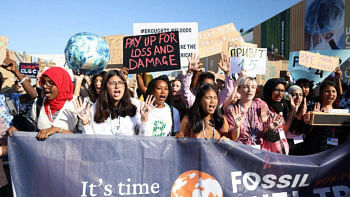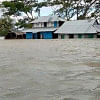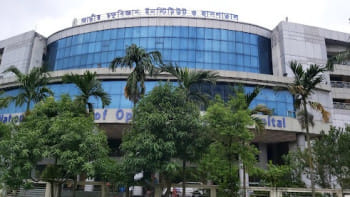Climate adaptation governance requires local voices

Bangladesh is one of the most climate-vulnerable countries globally, with its unique geography and socio-economic conditions leaving it particularly exposed to the impacts of rising sea levels, salinity intrusion, cyclones, and unpredictable weather patterns. However, beyond these environmental challenges lies a critical factor that shapes the country's response to climate change: governance.
As the global focus shifts from merely mitigating climate change to adapting to its inevitable consequences, Bangladesh faces a survival challenge. Adaptation is not just about policy but about ensuring that governance structures are robust, inclusive, and equitable to allow for effective climate resilience. Governance is the key to how well Bangladesh can navigate the climate crisis.
Governance encompasses the processes, institutions, and actors that determine how decisions about public matters are made and implemented. When it comes to climate change adaptation, it involves multiple levels of governance—local, regional, national, and international. In Bangladesh, managing these levels of authority effectively is a significant challenge, as national policies are often disconnected from the realities of local communities.
Bangladesh has made substantial progress in establishing climate governance frameworks, including the Bangladesh Climate Change Resilience Fund (BCCRF) and the Bangladesh Climate Change Strategy and Action Plan (BCCSAP). Numerous representatives from the Bangladeshi government, civil society organisations (CSOs), and the private sector are actively contributing to the global climate adaptation policy dialogue. These efforts reflect a strong commitment to addressing climate risks. However, the true measure of effective governance lies in the translation of these policies into tangible local actions, particularly in vulnerable rural and coastal regions like the Sundarbans mangrove forest region and coastal districts, such as Cox's Bazar.
The Sundarbans is one of Bangladesh's most climate-vulnerable regions, home to the Munda indigenous communities. These communities rely on fishing, agriculture, and forest products for their livelihoods. The region has already experienced the devastating effects of climate change, including rising sea levels, salinity intrusion, and frequent cyclones. For the Munda people, adapting to these changes is not just a necessity but vital for preserving their culture and livelihoods.
Despite their vulnerability, marginalised communities like the Munda often find themselves excluded from decision-making processes that directly affect them. Top-down governance approaches that fail to include local voices risk perpetuating inequality and reducing the effectiveness of adaptation efforts. This gap between policy formulation and implementation is a major issue in Bangladesh's adaptation governance.
Multi-level governance recognises that no single entity—national governments or local authorities—can address climate change adaptation on its own. Instead, adaptation requires coordination between various stakeholders, including local governments, civil society, NGOs, and community leaders. In Bangladesh, this is particularly important due to the diversity of ecosystems and the economic disparities between regions.
Local governments, especially union parishads (the lowest administrative unit in rural areas), play a critical role in implementing climate adaptation strategies. However, many of these local bodies lack the resources, technical capacity, and autonomy needed to design and execute comprehensive plans. This disconnect between local needs and national priorities can be seen in disaster management practices. While cyclone shelters may be built, they are often poorly located or inadequately equipped due to insufficient local input and coordination.
At the national level, governance frameworks often operate in silos, with limited integration between climate adaptation policies and other critical sectors such as disaster risk reduction, livelihoods, and infrastructure. A lack of policy coherence hampers the effectiveness of adaptation efforts, as conflicting goals across sectors can lead to resource misallocation. While the National Adaptation Programme of Action (NAPA) and the BCCSAP offer essential policy guidance, their success depends on how well they are implemented locally, particularly in areas like the Sundarbans.
To address these governance gaps, it is essential to value community-based adaptation and indigenous knowledge systems. The Munda people and other indigenous communities in the Sundarbans have lived there for generations, developing traditional knowledge and practices that help them withstand climate shocks. These practices include managing saline soils, sustainable fishing techniques, and disaster preparedness systems.
However, the integration of indigenous knowledge into formal governance frameworks remains limited. Community-based adaptation empowers local populations and ensures that strategies are context-specific and culturally appropriate. Local governance structures must be more inclusive, allowing indigenous communities to have a say in decision-making processes. This requires moving away from a purely technocratic approach to one that values the lived experiences and knowledge of vulnerable communities.
A major concern in climate change adaptation governance is equity and justice. In Bangladesh, climate change disproportionately impacts the poor and marginalised, who often lack the resources needed to recover from climate shocks. As the country advances its adaptation agenda, it is essential to ensure that adaptation efforts are equitable.
Distributive justice requires that vulnerable communities receive adequate support, both financially and in terms of policy attention. This can be achieved through targeted financial mechanisms such as grants or subsidies for climate-resilient agriculture, infrastructure, or livelihood diversification. At the same time, procedural justice ensures that marginalised groups are involved in adaptation planning and decision-making, enhancing the legitimacy and effectiveness of adaptation strategies.
As Bangladesh navigates the complex challenges of climate change adaptation, governance will be the deciding factor in whether these efforts succeed or fail. While the country has made significant strides in developing climate policies, the real challenge lies in bridging the gap between national frameworks and local realities. Achieving this will require stronger multi-level governance, improved policy coherence, and a commitment to equity, inclusion, and justice. Integrating indigenous knowledge, empowering local communities, and grounding adaptation strategies in the specific contexts of each region can help Bangladesh foster a more resilient future for all its citizens. Ultimately, effective governance is about more than just policies and institutions. It is about creating systems where every voice is heard and every community is empowered to thrive in a changing climate.
Nazrul Islam is a development analyst and former Bangladesh country director of Relief International. The views expressed in this article are his own. He can be reached at [email protected].
Views expressed in this article are the author's own.
Follow The Daily Star Opinion on Facebook for the latest opinions, commentaries and analyses by experts and professionals. To contribute your article or letter to The Daily Star Opinion, see our guidelines for submission.

 For all latest news, follow The Daily Star's Google News channel.
For all latest news, follow The Daily Star's Google News channel. 











Comments